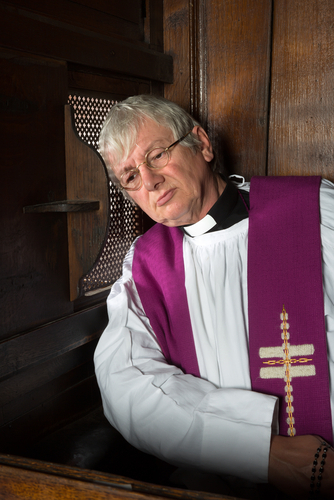Hemant Mehta's Blog, page 1932
September 9, 2014
A Guide to Better Prose
Reading a book about how to write sounds downright awful, but if Steven Pinker‘s the author, I’ll finish the whole thing the day it’s released like it’s a magical eighth Harry Potter book. The Sense of Style comes out at the end of the month and Pinker explains the premise in the video below:
I can’t wait to learn how to write gooder.
September 8, 2014
Ray Comfort’s Next Movie is All About the Problems with Homosexuality
I can’t believe he’s making this film and there’s not a single banana in the promotional video.
A lost opportunity…
But here, have a listen to Comfort talk about what happened as he saw “two girls kissing as they walked towards” him:
Comfort has raised about half of the $175,000 he wants for the film. If it’s anything like his previous movies, it’ll be watched mostly by his critics, change absolutely nothing, and Comfort will still pretend it’s a rousing success.
(via Christian Nightmares)
Remembering the Brave Young Woman Who Refused to Say the Pledge of Allegiance Nearly 80 Years Ago
Usually, when I mention Jehovah’s Witnesses on this site, it’s not for a good reason. But we owe them a tremendous debt of gratitude.
In 1935, fifth-grader William Gobitas refused to say the Pledge of Allegiance because treating the flag like an idol went against his family’s JW faith. His 12-year-old sister Lillian did the same thing the next day.
William (left) and Lillian (right) with father Walter Gobitas (via Jehovah’s Witnesses)
They were both expelled from the Minersville School District in Pennsylvania quickly after that. Their parents were forced to pay for a private school, and that was the beginning of a lawsuit that went all the way up to the Supreme Court.
In 1940, in Minersville School District v. Gobitis, the Court ruled 8-1… in favor of the school district. Seriously. They said it wasn’t a violation of religious freedom to compel students to say the Pledge. It was such an awful decision, the Court (with a different makeup) reversed itself three years later in West Virginia State Board of Education v. Barnette.
In the interim, things were really horrible for JWs:
The high court’s [1940] ruling had a dramatic impact. A Jehovah’s Witnesses church in Maine was burned. Members of the sect were threatened and bullied. Their children were expelled from public schools around the country.
“It was open season on Jehovah’s Witnesses,” [Lillian Gobitas] Klose said. “All over the country, there were mobs… This went on for three years.”
Yet the siblings stood strong throughout all of that. It was the same sort of courage we saw decades later with a young Ellery Schempp refusing to take part in mandatory Bible readings at his public school.
For 12-year-old Lillian, the sting from her act of conscience — which she said was entirely the result of her own thinking, not her parents’ — was sharp. Children threw rocks at her, The Washington Post reported in 1988.
She overheard two girls talking. “We used to be friends with her,” one said. People jeered the family on the streets. William was beaten by schoolmates. Local churches led a boycott of the family’s grocery store.
The 1943 case (reversing the original ruling) was one of the first times the First Amendment was invoked to protect the rights of minority beliefs. It’s perhaps the sharpest tool in the atheist arsenal and we have Jehovah’s Witnesses to thank for it.
I bring this all up because Lillian Klose died a couple of weeks ago at the age of 90. The New York Times published a lovely obituary in yesterday’s paper.
It’s worth reflecting on her incredible courage and everything she went through because of her convictions. We all want to believe we would’ve done the same thing in her situation… but that’s so much easier said than done. Klose may not have won her legal case, but she tipped one of the initial dominoes for a line of defense we still use today. That’a legacy that won’t be forgotten anytime soon.
Pittsburgh Newspaper Calls Proposed “In God We Trust” Display a “Misplaced Motto”
The Allegheny County Council in Pennsylvania is considering putting up an “In God We Trust” display in the County Courthouse in the name of patriotism. It’ll come as no surprise to you that the proposal was made by an openly evangelical council member Sue Means (below), since this is really just a cover to push her faith through the government.
But I was pleasantly surprised to see the Pittsburgh Post-Gazette come out with an editorial today calling the display a “Misplaced Motto“:
… To make a statement about patriotism, the Stars and Stripes displayed at a meeting always serves the purpose. But if council wants to boost the cause of religion, then it is not following the job description of any government entity.
…
Americans understand well enough that while “In God We Trust” seems inclusive of other monotheistic religions, its wellspring is the politically charged notion that this is a “Christian nation.”
And the offense to those who will object is not mitigated by hiding the religious message among the clutter of other slogans. Sometimes the best slogan is “Leave well enough alone.”
Why is it that the most sensible people are never the ones in office…?
(Thanks to Tom for the link)
It’s Incredible How Easy It Is for These New Zealand Politicians to Admit They Don’t Believe in God
The New Zealand Herald asked the leaders of the nation’s various political parties to give their thoughts on a variety of subjects, including whether or not they “have a God.”
Check out this unbelievable video:
It’s fascinating to me for a couple of reasons:
If this was the United States, you would’ve just heard “I’m a proud Christian” on a loop. There’s such a diversity of beliefs in the New Zealand Parliament!
More importantly, the atheists have no hesitation saying so!
Prime Minister John Key answered the question with, “I’d probably say no. I’m not a deeply religious person and I don’t believe in life after death.”
Green Party leader Metiria Turei laughed off the question, responding, “My dog, maybe? Ha! No, I don’t have a God.”
ACT leader Jamie Whyte quickly dismissed the question altogether: “No, I’m an atheist.”
I have no idea what their other political views are, but on this issue alone, I’m jealous.
(Thanks to E. for the link)
Friendly Atheist Podcast Episode 15: Myq Kaplan, Comedian
Our latest podcast guest is comedian Myq Kaplan:
(Photo via Mindy Tucker)
Myq is a comedian who has appeared on Last Comic Standing and every late night talk show you can think of. He’s known for his brilliant wordplay as well as his self-deprecating humor. His albums “Vegan Mind Meld” and “Meat Robot” are absolutely hilarious, but his latest show “Small, Dork and Handsome” is, in my opinion, his best one yet. It’s on Netflix right now and you’re gonna want to watch it… after you listen to this interview.
We spoke with Myq about why most comedians seem to be non-religious, whether his jokes are ever truly finished, and what he learned from Louis C.K.
We’d love to hear your thoughts on the podcast. If you have any suggestions for people we should chat with, please leave them in the comments, too.
You can subscribe to the podcast on iTunes, get the MP3 directly, check it out on Stitcher, or just listen to the whole thing below.
And if you like what you’re hearing, please consider supporting this site on Patreon and leaving us a positive rating!
Are Catholic Priests Obligated to Report Confessions Involving Abuse? The Supreme Court May Soon Decide
It’s a long-standing tradition: What’s revealed to a priest in the sacrament of confession cannot be repeated or shared with anyone else. They call it the Seal of Confession. Up until recently, the law accepted this as moral and desirable.
But that tradition has now been called into question and the Supreme Court may end up ruling on it.
The Diocese of Baton Rouge has asked the U.S. Supreme Court to review a decision by the State of Louisiana Supreme Court, in which local priest Father Jeff Bayhi was punished for failing to report the sexual abuse of one of his young female parishioners, which the child in question allegedly disclosed during a confession in 2008. The abuser (another parishioner, not a priest) is now dead, but the girl’s parents have sued him — as well as Father Bayhi and the Diocese of Baton Rouge — for the priest’s failure to report the abuse to authorities, as per the state’s mandatory reporting laws. The family alleges that Bayhi’s silence allowed the abuse to continue until the abuser died.
The Louisiana Supreme Court’s decision gives some of the case’s history. Before the initial trial began, the Church filed a motion to keep any mention of these confessions out of the trial. The lower court dismissed this motion; the teenager held privilege and was entitled to waive it if she wanted. The appellate court reversed this decision, finding that Bayhi was not legally required to report the abuse because the Seal of the Confessional is legally protected by confidentiality laws.
The state Supreme Court was asked to determine whether Bayhi could be compelled to reveal whether or not his young parishioner came to him in confession and what (if anything) she confessed. The justices determined that the girl had the right to waive her confidentiality privileges, meaning the Church could not keep her testimony out of the trial if she wanted to speak. Nor could the priest cite confidentiality as a reason to not testify once the girl herself had waived the privilege.
Moreover, the court noted that a clergyperson has a mandatory duty to report any suspicious interactions he observed outside of the confessional, as well as reports of abuse or criminal activity gained through pastoral counseling or spiritual direction, where confidentiality has limits. Priests can also ask the penitent to repeat the information outside of the confessional, freeing themselves to report. The decision argued that Bayhi’s behavior should be examined in a court of law, not presumed legal and dismissed out of hand.
Needless to say, the Church didn’t like that. The Baton Rouge Diocese chose to respond by playing the same old, shabby, overplayed religious freedom card. And, as usual, that involves placing the laws of the Church above the laws of the land and the rights of actual people:
Church law does not allow either the plaintiff (penitent) or anyone else to waive the seal of confession… This matter is of serious consequence for all religions, not just the Catholic faith. The statutes involved in this matter address ‘sacred communications’ which are confidential and are exempt from mandatory reporting. For a civil court to impinge upon the freedom of religion is a clear violation and the matter will be taken to the highest court in the land by the church in order to protect its free exercise of religion.
The Diocese of Baton Rouge almost certainly moved to exclude all mention of the confession from the trial to protect its reputation. This may be related to the Church’s flourishing reputation as an institution that protects abusers, or it may just be because Bayhi was so callous in his advice about the abuse. The Court reports that, according to the teenager’s deposition, Bayhi told her “she needed to handle the situation herself” and advised her to “sweep it under the floor and get rid of it.”
The Survivors Network of those Abused by Priests issued a statement in which it pointed out the Church’s shoddy track record on abuse reporting and reminded readers that, in past cases, Catholic officials have falsely claimed that reportable conversations with young parishioners were confessions in order to get around mandatory reporting laws. While they profess to “hope that is not the case here,” the director of SNAP pointed out,
This is what happens when Catholic officials conceal child sex crimes for decades — they lose credibility among judges. And this is what happens when Catholic officials deliberately and deceptively exploit confessional confidentiality.
(Image via Shutterstock)
American Humanist Association Launches Campaign Urging Students to Stay Seated During the Pledge of Allegiance
Last week, the American Humanist Association released the results of a poll they conducted about the phrase “Under God” in the Pledge. The poll showed that when people are told about the history of the phrase — how it was added to the Pledge in 1954 during the Cold War — more than a third of respondents supported removing the phrase.
The AHA is following up those results today with what’s sure to be a controversial national campaign. They’re urging students to remain seated during daily recitations of the Pledge of Allegiance to show solidarity with the non-religious people who are being discriminated against — and that means educating everyone about the history of “Under God.” The campaign includes bus ads in Washington, D.C. and New York City as well as 15-second ads on YouTube:
In addition to teaching people about when “Under God” was added to the Pledge, the AHA also wants to remind students that the Supreme Court, in the 1943 case West Virginia State Board of Education v. Barnette, made clear that no one can be punished for staying seated during the Pledge.
“Through the daily Pledge exercise, our public schools are defining patriotism by promoting god-belief while stigmatizing atheist and humanist children,” said David Niose, legal director of the American Humanist Association’s Appignani Humanist Legal Center. “This violates the principles of equal rights and nondiscrimination, which is why we are currently challenging ‘under God’ in the Pledge with a lawsuit in New Jersey.”
You may recall that Niose lost a recent case in Massachusetts in which he was trying to get the state Supreme Court to declare the Pledge unconstitutional for reasons of discrimination. They’re trying it once again, as he said, in New Jersey.
The big question regarding their campaign is whether any students will refuse to stand as a result of it. You can be fully educated about the history of the Pledge and know your rights, and that still may not be enough for students to take on the role of class lightning rod. Hell, if I were in their shoes, I’m not sure if I’d want to do it. But it would be an amazing thing to see groups of students — including religious ones — remain seated in solidarity with atheists so that one of their classmates isn’t singled out.
The AHA is also offering legal resources to students who are punished in any way for remaining seated.
In case you think that never happens, I would point you to a student in New York who was punished for not standing for the Pledge earlier this year. It happened in 2012 in New Jersey, too.
On the flip side, when a couple of elementary school students remain seated last year, one of them convinced most of her classmates to join her.
Let’s see more brave students lead a similar charge.
Despite Going Through Ten Years of Conversion Therapy, She Finally Had the Wedding of Her Dreams
The September issue of D Magazine features the story of Amanda Barbour, a woman who went through Exodus international and their ex-gay conversion therapy, but later came out for a second (and last) time and ended up (finally) marrying another woman with the support of her family.
“I am a lesbian,” Amanda told the pastor. “This is who I am.”
“I understand that you think that,” the pastor said. “But let’s just talk. Let’s talk about how you got into the situation. Let me get to know you.”
…
Amanda went back to school and told [girlfriend] Shannon that she couldn’t see her anymore. It was agonizing. Shannon cried so violently that she began to retch. Still, Amanda was firm.
“If I want my family,” she said, “if I want my dad, then I can’t have you.”
Amanda felt empty. Without Shannon, she felt like she’d never be strong again. For weeks, she subsisted on coffee and cigarettes. And when the semester was over, she left school and moved back in with her parents.
To them, this wasn’t too different from her brother’s addiction. They encouraged Amanda to meet with their church’s pastor again. The pastor introduced her to a local Exodus group, which taught that homosexuality is a sin and preached that with conversion therapy — also called “reparative therapy” — God can change your sexual orientation.
This story is important as the Christian community is slowly coming to a general consensus that conversion therapy (to “pray away the gay”) is counterproductive and useless. To date, the current modern Christian evangelical responses to LGBTQ identity issues have been one of three schools of thought:
Same-sex attraction (which is an imperfect phrase, but the only understanding of LGBTQ identity in most church communities) is a psychological disorder that can be cured with enough discipline, therapy, and focused self-control.Same-sex attraction is something natural that can’t be helped, but acting on the attraction is clearly condemned by Scripture and so LGBTQ individuals must remain celibate or express themselves sexually only in heteronormative ways.Same-sex attraction is something natural that can’t be helped, and the Bible isn’t clear about condemning it because of certain contextual facts about the worship rites in the communities to whom the apostles wrote the epistles. Therefore, while pedophilia and prostitution are obviously condemned, non-heternonormative sexual expression may not be. So it’s fine as long as it’s practiced ethically.Position #1 is quickly fading from the modern church due to criticism from the medical and psychiatric communities and better public awareness of the issue, even though it has been the historical norm in recent centuries. (The debate about the early church’s position on LGBTQ identity and sexual expression is heated and involved.)
Position #2 was the more “liberal” position in recent decades, but it’s quickly becoming the default conservative stance. And position #3 is the current liberal stance and is becoming quickly more popular.
The D Magazine piece is an excellent #longread piece if you’re curious about what it might be like to come out to a family operating under the assumptions of position #1.
(Image via Shutterstock)
Fargo Officials Have Spent More Than $120,000 of Taxpayer Money to Defend a Ten Commandments Monument
A couple of weeks ago, I posted about a Ten Commandments monument in the city of Fargo, North Dakota.
(Image via Secular News Daily)
It was donated by the Fraternal Order of Eagles in 1958 and was the only religious monument of its kind on city property. Long story short, it remains there even after two separate legal challenges.
The most recent one involved the Red River Freethinkers offering to pay for their own secular monument to be erected nearby the Ten Commandments one. But rather than allow that to happen, the city council voted on a new policy stating that no one else could put up a monument on the property. If that sounds illegal, that’s because it totally is. Last week, however, an Appeals Court ruled 2-1 in favor of the city.
I’m happy to say that Charles Sawicki, the president of the freethinkers group, says the fight’s not over yet:
A lawyer for the Red River Freethinkers intends to appeal an Aug. 25 ruling by a three-judge panel that sided with the city in a dispute over a monument of the Ten Commandments on public property near City Hall, said [Sawicki].
…
Sawicki said the group hit the $15,000 cap on what its members were willing to spend on the suit, but donors offered to pay for an appeal to a panel of all the 8th Circuit judges.
The next step would be to ask the entire Appeals Court to review the ruling (instead of just the three judges from before).
Here’s the kicker, though: The city officials have spent more than $120,000 of the taxpayers’ money on legal fees between these two lawsuits already. (The reason for the excessive cost is that they’re using a law firm from neighboring Minnesota that bills $270/hour, though spending anything defending this monument is too much.)
The city has spent $88,115 on the current lawsuit, said Kent Costin, the city’s finance director.
…
The first Freethinkers suit, filed in 2002, ended in 2005 when a judge ruled that the monument could stay because it represented both religious and secular messages.
That suit cost the city about $35,000, Mayor Dennis Walaker said at the time.
…
The city budgeted $50,000 for legal defense and claim payments this year, Costin said.
Unbelievable. And a complete waste of money.
It would have cost them — and the taxpayers — absolutely nothing to allow the atheists’ monument to be placed on city property. It would’ve cost virtually nothing to move the Ten Commandments monument to a local church where it belongs.
Instead, they have nothing better to do with that much money than to make sure Christianity remains the official religion of Fargo.
If I were living in Fargo, I’d be furious. Let’s hope there’s someone leading the charge to unseat the irresponsible elected officials who voted to keep this baseless fight going.
(Thanks to Chengis for the link)
Hemant Mehta's Blog
- Hemant Mehta's profile
- 39 followers














